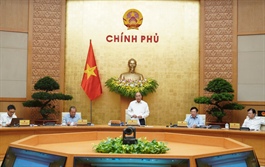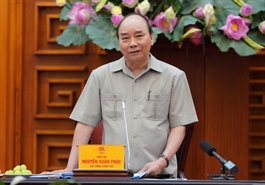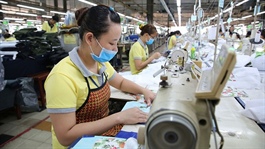Vietnam – one of the best long-term growth stories in Asia
Vietnam – one of the best long-term growth stories in Asia
Vietnam is one of the best long-term growth stories in Asia and is one of the most preferred frontier markets, according to HSBC. There is a long list of reasons why the bank remains positive on the country’s equity market.
HSBC's reasons range from the healthy state of foreign direct investment (FDI), rising share of global exports, the country’s impressive handling of the COVID-19 crisis, and higher levels of government investment to policy reforms which will increase foreign ownership limits and a consistent reduction in debt levels among listed companies. Stocks are cheap, too.

Photo: Pho Vietnam – Vietnamese beef noodle
|
The one caveat is that the Vietnamese market is driven by local retail investors, so near-term movements are not always based on fundamentals. Having said that, any decline should be seen as an opportunity to accumulate.
Given the strong growth momentum, foreign investors do not have to dig deep to generate alpha. From past performances, they are better off sticking to market leaders. Also, large-cap stocks are best positioned to handle the disruption caused by COVID-19 and should benefit from the country’s rosy long-term economic prospects.
FDI – the key driver of Vietnam’s growth
1) Vietnam is party to a number of free trade agreements (FTA);
2) Outside China, the country is one of the most attractive destinations for overseas companies;
3) Vietnam is moving up the value-added ladder;
4) It provides an attractive trade-off between cost and productivity; and
5) COVID-19 and increasing US-China trade tensions should accelerate the process of companies rejigging their supply chains.
Economic indicators showing signs of normalisation
Despite the pandemic, most economic indicators are showing signs of normalisation. The economy is getting back on track. Vietnam’s second-quarter GDP grew 0.4 per cent on-year despite lockdowns and the impact of COVID-19. HSBC economists forecast GDP growth of 3.0 per cent in 2020 in Vietnam, the only ASEAN country they expect to have positive growth this year.
Public investment to get a boost
Vietnam has budgeted close to VND700 trillion ($30.43 billion) for public investment in 2020. While the government is pushing public investment, the pace has been slower with only 20 per cent of the funds budgeted for 2020 used in the first half of the year. Cities and provinces have also not spent any money from the government’s official development assistance fund worth $2.6 billion.
Infrastructure spending could boost real estate activity
Vietnam still has a large infrastructure gap but has been investing heavily in recent years. One of the key initiatives are the metro rail projects in Hanoi and Ho Chi Minh City. News reports suggest Ho Chi Minh City plans to focus on the construction of high-rise projects along metro routes instead of the downtown area. Increasing connectivity from metro projects could help spur development in the real estate sector.
Reforms like state-owned enterprise equitisation and new securities law underway
The National Assembly approved the new securities law last November, which will come into effect on January 1, 2021. The government recently announced a draft decree which provides details on a number of articles needed to implement the new law.
The goal is to reduce the number of conditions for business and investments, simplify procedures, and enhance the transparency of the market to international standards among other factors, as per the State Securities Commission.

Vietnam will divest 120 SOEs this year. Photo: Sabeco
|
MSCI and FTSE upgrade to Emerging Market status
In order for a market to be upgraded to emerging market (EM) status, it must meet various quantitative and qualitative criteria. Vietnam meets the quantitative criteria, such as the presence of large stocks, trading volumes, and the size of the market. The reason why Vietnam has not been upgraded yet, however, is due to qualitative factors.
A recent report by HSBC emphasised that FTSE has placed Vietnam under review for an upgrade to secondary emerging market status, while MSCI has not yet placed it on its watch list for upgrades. The earliest Vietnam could be placed on MSCI’s watch list for upgrades is mid-2021 and then it could be upgraded to EM status a year later.
MSCI had cited the presence of foreign ownership limits, a lack of some disclosures in English, the lack of an offshore currency market, and limitations in onshore currency markets, mandatory registration of accounts, prefunding of trades, and restrictions on off-market transfers.
In response, the government has amended its securities law to provide a more level playing field to foreign investors. It has also proposed draft amendments to its investment law and company law, which should help provide the regulatory framework to increase foreign ownership limits.
VIR also reported that Vietnam is set to become the largest frontier market after Kuwait was upgraded to EM status by MSCI.
However, there is a risk that Vietnam’s weight in the FM index could be reduced if MSCI downgrades EM markets which are under review to frontier category. Overall, HSBC believed that the thesis to invest in Vietnam equities should centre around the country’s growth prospects rather than the timing of an upgrade.
Valuations are attractive and leverage levels remain low
Vietnam’s listed companies (ex-financials) have been reducing their leverage in the past five years and have a low net debt to equity of 18 per cent, which reduces risks for the market. On the valuation front, the market looks cheap and trades at a 12 million trailing Price-to-Earnings (PE) of 12.8x, below its five- year average of 15.7x.
Consensus expects earnings to decline by 13.6 per cent in 2020 due to the impact of COVID-19. Vietnam’s equity market is typically driven by retail investors and less so by foreign indirect investment (FII). However, the market has seen smaller FII outflows compared to other markets in Asia at around $33 million, after large inflows in June.
Therefore, HSBC remained positive on Vietnam and preferred large-cap stocks within the market
“If Vietnam were a company, we would highlight market share gains, a strong balance sheet, robust growth, and good management. We maintain our positive view on Vietnam. Given the strong growth momentum, we believe foreign investors don’t have to dig deep to generate alpha. We believe sector-leading large-cap stocks are best positioned to handle the disruption caused by COVID-19 and should benefit from one of Asia’s best long-term growth stories,” said the report.
Some risks to HSBC views on Vietnam
COVID-19: Vietnamese authorities have done a good job in containing the transmission so far. This increases HSBC's confidence that Vietnam is better prepared to deal with any further waves. However, it is worth remembering that COVID-19 is a pandemic which is unpredictable and, as such, can impact Vietnam more negatively than we anticipate.
Banking sector: Fitch lowered its credit outlook for Vietnamese banks due to expectations of higher credit stress, lower credit demand, lower profitability due to narrowing margins, and higher provisions.
Infrastructure needs: Vietnam has been financing infrastructure through the state budget and international assistance but now private investors are needed. Thus, the country needs to encourage more long-term infrastructure investors. Otherwise, roads, rail, and ports will lag behind growth.
Rapidly rising cost of production: Wages are rising, labour is hard to get, and most of the sought-after industrial zones are operating at high occupancy levels. In short, costs are rising. This could make the cost-benefit analysis less attractive for foreign investors to produce in Vietnam.

























